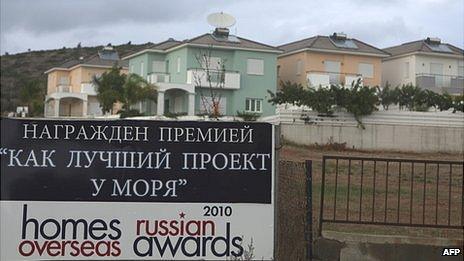Debt crisis overshadows Cyprus presidential election
- Published

Some Cypriots are calling it mission impossible - the task of digging the small Mediterranean island of Cyprus out of debt.
However difficult the task is, the new president, who will be elected by the end of this month at the latest, will have to take up the challenge.
The first round of voting is on Sunday, with a likely run-off a week later, on 24 February.
The three frontrunners are Nicos Anastasiades of the centre-right Disy party, independent George Lilikas and left-winger Stavros Malas.
When the financial crisis first swept through Europe in 2007-8 Cyprus seemed immune from danger, protected by buoyant tourism and a large and thriving financial services sector.
In fact it was the economy's reliance on banking - and its close financial ties to Greece - that proved to be Cyprus's undoing.
The Greek "haircut" - in which private bondholders suffered big losses - resulted in about 75% of Cypriot banks' investments going down the drain.
The foundations of the economy collapsed - though this did not involve the breakaway north, whose economy is tied to Turkey's and which is diplomatically isolated.
Some economists, like Stelios Platis, believe Cypriot banks were misguided when they invested so heavily in risky Greek bonds.
"They were greedy and complacent," he says. "They saw the Greek crisis approaching but they chose not to move away."
Many Cypriots, on the other hand, lay the blame for the current difficulties on the man who has been president for the past five years, Demetris Christofias.
"The economy has come to a standstill," says Nicosia-based accountant Sandro Dikaios.
"All we see are increasing lines of the unemployed and lines of empty shops. It's absolutely heartbreaking - so many years of hard work thrown away by a government which simply doesn't know what to do about it."
Critics accused Mr Christofias, leader of the communist Akel party, of indecision.
He appeared reluctant to ask the troika - the IMF, European Commission and European Central Bank - for economic help.
Instead he turned to Russia, the source of a pre-crisis 2.5bn euros (£2.1bn;$3.2bn) loan. But on this occasion Moscow and Beijing declined to help.
Dirty money?
Last year Mr Christofias finally asked the Europeans for a bailout - to the tune of 17.5bn euros.
This was agreed in principle. But while Cyprus started meeting the terms of the package by introducing austerity measures, not all of Europe was keen on helping the island in this way.
Fears were expressed that European taxpayers could find themselves funding Russian mafia operations on the island.
Since the 1990s Cypriot banks have assiduously courted Russian depositors and investors, leading to suspicions in Germany and elsewhere that the island is awash with dirty money.
Cyprus-based economist Fiona Mullen believes the accusation is not entirely unjustified, but has been exaggerated.
The island, she says, suffers from an image problem, pointing out that "there is a lot of legitimate Russian investment here".
"Cyprus does relatively more business with Russia than other countries, largely because of its double taxation agreement."
Improving Cyprus's image in Europe will be one of the main tasks of the next president.
Public sector cuts
If the polls are correct and the winner is Nicos Anastasiades, then there could well be progress in this direction.
Mr Anastasiades has built a strong relationship with German Chancellor Angela Merkel and other European leaders, and has presented himself as the candidate best suited to deal with Brussels.
But he will be judged by Cypriots on his success or failure to end an economic crisis that has already seen their standard of living decline.
Under austerity measures introduced thus far, civil servants have taken an average 10% cut in pay, VAT has been increased and the cost of living allowance has been suspended.
Cypriots are in no mood for more cuts of this kind.
Yet there is likely to be more hardship ahead.
As European bailouts go, 17.5bn euros may not seem such a huge amount.
But the size of the Cypriot economy means that by 2016 the debt would reach what the IMF regards as the unsustainable level of 140% of annual GDP.
The only option for Cyprus then is to somehow reduce the amount it needs to borrow in the first place.
So what might Mr Anastasiades have up his sleeve?
One of his key policies is to raise capital by seeking strategic investors for the state-run electricity, telephone and ports authorities - if not opting for outright privatisation.
There have also been suggestions that private depositors with investments of more than 100,000 euros should be obliged to endure a "haircut".
But economists argue that this would inflict such damage on investor confidence across the EU that it should only be considered as a last resort, a "nuclear option".
Whatever option the new president decides on, economist Symeon Matsis says that he "will have to build bridges with his EU partners".
"Their confidence in Cyprus has been badly damaged. But he won't have much time, a lot of time has been wasted already."
In short, Cyprus's new head of state will face an unenviable task - even if it is not mission impossible.
- Published7 April 2023
- Published27 November 2012
- Published27 June 2012